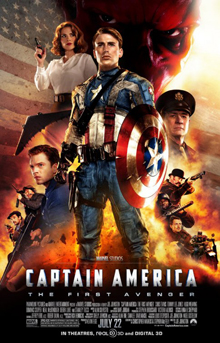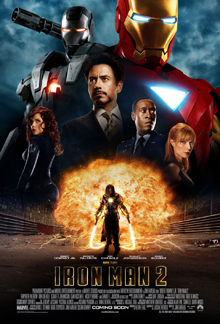Currently standing at over $18 billion in revenue, the Marvel Cinematic Universe is the most financially successful movie franchise in history. To make this an even more incredible feat, the MCU is only a little over 10 years old.
How in the world did this happen?
PRE- IRON MAN

We've had super hero films for decades, but they tended to be sporadic, not like the ubiquity we find today. In 1997. Batman and Robin, was such a critical and commercial bomb that most studios that were developing super hero properties halted production. A year earlier, Marvel had declared bankruptcy and cut a number of staff members. To make money, Marvel had licensed film rights to its characters to various studios (many of whom halted development). Universal had Hulk. Sony had Spider-Man. Fox had X-Men. New Line had Blade and Iron Man. Blade became a moderate hit and X-Men a full-blown hit (which has since been credited with re-vitalizing the super-hero genre). But Marvel made little to no money from these deals.
So that's when they decided to form their own production studio so that they could manage their own cinematic properties. This also gave them the idea to do in the movies what they had always done in the comics: build a cinematic universe.
But in order to do this, they had to start with just the right property.
IRON MAN
While he was known well by comic book readers, Iron Man did not have nearly the same name recognition as Spider-Man or Hulk. But director Jon Favreau was tapped to bring this character to life. In order to guarantee a huge box office return, Marvel wanted to cast as Tony a big movie star... Tom Cruise!
Jon Favreau instead fought tooth and nail to have them instead hire Robert Downey Jr. It seems incredible to think of this now, but Downey Jr. was considered an incredibly risky choice. His personal struggles with addiction and prison had been well-documented in the press. He even lost out on some jobs because insurance companies would cover him for the film shoot. Also, his highest grossing film to date was Back to School at $91 million, in which he played a supporting role to star Rodney Dangerfield.
But Favreau went with his instincts and pushed hard for Downey Jr. Now, I think that Cruise is an excellent actor and would have made a good Tony Stark. But one thing is clear:
Robert Downey Jr. is one of the most important reasons for the success of the MCU
This is not to lesson Favreau's vision or the word of studio heads Avi Arad and Kevin Feige. But someone had to become the face of the MCU and that was Robert Downey Jr. The opening scene of Iron Man was crucial because in those few moments, we get a strong sense of Tony's character and charisma in a way that only Downey Jr. could do.
Downey Jr. is a fantastic actor. A look at some of his work in films like Chaplin should be proof enough. But audiences had to fall in love with Tony Stark. And in his performance, Downey Jr. created somebody who, even at his worst, was so incredibly cool and likeable that men wanted to be him and women wanted to be with him. At the same time, he gave an incredibly deep performance as a man who comes to terms with his own redemption. I still am so moved by how Downey Jr. delivers the lines to the dying Yinsen: "You saved me."
Incorporated in this was Favreu's solid action direction while crafting the classic hero origin story.
One of the reasons these film resonate is that in order to be harmonious with the universal hero myth, the story has to touch on essential eternal truths about human nature, morality, and goodness. The hero can be flawed, as Tony clearly is. But his path to heroism must be a growth out of selfishness to selflessness. And we saw this begin in Iron Man.
And then at the end, the bold introduction of Nick Fury and the Avengers Initiative hinted at something much larger than a mere sequel.
POST-IRON MAN/ PRE-AVENGERS

Marvel developed another movie at the same time as Iron Man: The Incredible Hulk. This character had much more name recognition, but it was a reboot of the character a mere 5 years after another reboot that was poorly received by critics and audiences. This movie had a great actor in Edward Norton in the lead. It was also a much better film than Ang Lee's muddled mess. But audiences did not respond strongly. In fact, The Incredible Hulk did less than half of the box office as Iron Man. This did not bode well for future plans, even as Tony Stark made a cameo at the end of that film pointing to the upcoming Avengers.
It would appear that this gave Marvel a bit of pause. While The Incredible Hulk was not a bomb, it reminded them that there was no guarantee of success. In fact, in order to build to the Avengers, each film leading up to it had to be successful enough to not only gain a good return, but build enough interest so that The Avengers would be more successful than all of them.
This pause led to one of Marvel's greatest box office strengths, but also it's greatest creative deficit: course correction. Marvel will experiment a bit with their film formula, but only inasmuch as it gives them a bigger return. They hire very talented directors, but they keep tight control over a number of the creative aspects so that the films look and feel incredibly similar.
We can see this play out in Iron Man 2. Reportedly Favreau wanted to take the movie in some new creative directions. Marvel wanted to a repeat of the original hit (you can see this allegory play out in Favreau's following indie film Chef). The Incredible Hulk lacked a lot of the dry wit and humor of Iron Man, so Iron Man 2 was heavy with the quips. The sequel was about as successful as the original, but it did not generate the kind of love that people had for the first Iron Man.


Marvel held its breath as it released the its last two set up movies the following year: Thor and Captain America: The First Avenger. For Thor, they cast relative unknown Chris Hemsworth in the lead. To direct they picked Kenneth Branagh, best known for his Shakespearean films. This film introduced other worlds and magic. But like Iron Man, it mixed in good deal of jokes with the action. Thor made $130 million less than Iron Man, but it was enough to not a moderate hit. Captain America, played heavily into the tone and format of old 1940's serials in an over-the-top style. This movie did about $10 million less than Thor, but again it was enough to not be a bomb.
But everything in the great Marvel experiment hinged on the next film The Avengers. This movie only matched the average box office of the previous Marvel movies, then the MCU would have been a failure and Marvel would have lost more than you know. Why?
We will find out next week.

No comments:
Post a Comment